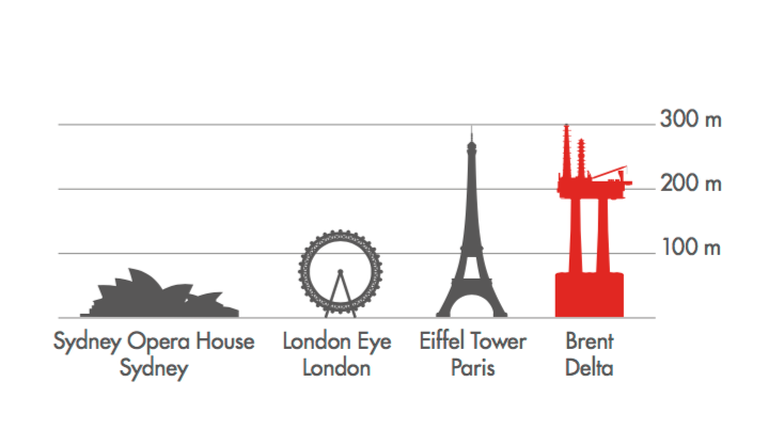
A group of experts in Tokyo suggested pouring radioactive water from Fukushima into the open sea. A marine biochemist explains the consequences of this absurd decision.
Shell raises the white flag and starts dismantling its oil platforms in the North Sea in 2017. A good piece of news that hides a sad environmental lagacy.
Shell is ready to dismiss its oil field’s four platforms in the North Sea, 115 miles north-east of the Shetland Islands. First step in 2017: dismantling the Brent Delta platform which will be remembered as the first large-scale project to decommission a depleted North Sea oil field. Second step: decommission the other three platforms, Alpha, Bravo and Charlie.
After planning the dismantling activities and transportation of the materials for 10 years, the start of the complex work has been delayed to 2017, according to Reuters. In fact, it took longer than expected to equip the specialist vessel that will transport the 25,000-tonne platform to Hartlepool harbour where it will be disassembled. Once it reaches its destination, the platform will be demolished and recycled. This is a huge work considering that Brent Delta is as tall as the Eiffel Tower (according to Shell).
The most widely discussed issue is exactly the plan for the removal of the Brent Delta. In fact Shell just wants to remove the topsides of the platforms and leave the concrete and steel base structures, 64 tanks and an unknown number of pipes and debris generated by drilling.
The platforms of the Brent oil field are made of three or four concrete legs that are about 165 metres long, 18 metres in diameter and rise to 25 metres above sea level. At their base there are 64 tanks or ‘subsea cells’ which had been used for oil storage, made of reinforced concrete that are 20 metres in diameter and 60 metres tall (taller than Nelson’s Column in Trafalgar Square and each with the capacity of four Olympic-size swimming pools).
Over the course of the years, 42 tanks have been used to store oil and once the platforms will be dismantled they will remain in the North Sea bottom entombed in thick walled concrete pyramids, according to Shell.
The multinational corporation came up with this solution after examining different methods for cleaning the tanks, without obtaining encouraging results. This is a delicate issue since these concrete tanks contain a highly polluting mixture of oil, water and a layer of debris. Disassembling and transporting them is so difficult and risky so Shell had to turn to NASA, even though in the end it decided to leave the tanks in the sea bottom. Besides the platforms of the Brent oil field, there are 140 wells and 103 kilometres of pipelines that will be left where they are.
In the presentation of its dismantlement plan Shell says it will use innovative techniques, ensuring the safety of people working on the project, having minimal impact on the environment and being economically responsible. But how long will it take for these materials to decompose? Shell itself provides an assessment.
The concrete legs above sea level will take between 150 to 300 years to disintegrate. The legs below sea level will take up to an additional 500 years to fall apart. And what about the 64 storage cells? They can take up to 1000 years to decompose.
In other words, if the Shell proposals are given the green light by the UK Government and by OSPAR, a body set up to safeguard the North-Atlantic environment, the platforms will affect Scots for the next 40 generations.
Siamo anche su WhatsApp. Segui il canale ufficiale LifeGate per restare aggiornata, aggiornato sulle ultime notizie e sulle nostre attività.
![]()
Quest'opera è distribuita con Licenza Creative Commons Attribuzione - Non commerciale - Non opere derivate 4.0 Internazionale.
A group of experts in Tokyo suggested pouring radioactive water from Fukushima into the open sea. A marine biochemist explains the consequences of this absurd decision.
The Bakken or Dakota Access Pipeline (DAPL), an underground oil pipeline project in the United States, is owned by a network of oil and pipeline companies, joint ventures and holding companies. After Trump revived it in January without the consent of the Sioux indigenous tribe affected by it and flouting environmental laws, many investors both from the US
The Alberta tar sands hold much of Canada’s oil wealth: the region contains an estimated 1.7 trillion barrels of bitumen oil. The size of this reserve makes it the third largest oil deposit in the world after Venezuela and Saudi Arabia. Yet despite this, the cost of extraction now outweighs the profit made per barrel.
A federal court in Washington, D.C. has struck down the Dakota Access Pipeline, following years of campaigning by the Standing Rock Sioux tribe.
The Scottish island of Eigg is self-sufficient for its energy needs, relying almost entirely on renewable sources, especially thanks to a coordinated community effort.
President Magufuli in unmovable in going ahead with the Stiegler’s Gorge dam despite conservationists’ warnings of the damage it will cause the Selous Game Reserve’s ecosystem and wildlife.
A large dam along the Luangwa River in Zambia would have posed a serious risk to local people and wildlife, leading hundreds of thousands to oppose it. A call to which the government responded by halting plans to build it.
The first one megawatt solar power plant in the Chernobyl exclusion zone has become operational. This is the first step in a renewable energy development project promoted by the Ukrainian government in the area.
A tanker exploded at a gas and petrol station in Nigeria’s Nasarawa state on the 10th of September, killing 35 people and leaving some burned beyond recognition; 3 citizens had several spine and brain injuries, 2 of them are still on Intesive Care Units. Fela Habila , a local singer, is now stable and out of danger but








